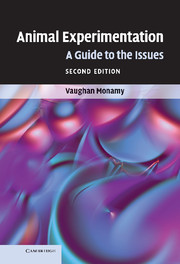Book contents
- Frontmatter
- Contents
- Preface to the second edition
- Acknowledgements
- 1 Issues in animal experimentation
- 2 A history of animal experimentation
- 3 Opposition to animal experimentation
- 4 The moral status of animals
- 5 Animal use
- 6 The regulation of experiments
- 7 Seeking alternatives
- 8 Conclusions
- Ethical guidelines for students in laboratory classes involving the use of animals or animal tissues
- References
- Index
4 - The moral status of animals
Published online by Cambridge University Press: 05 June 2012
- Frontmatter
- Contents
- Preface to the second edition
- Acknowledgements
- 1 Issues in animal experimentation
- 2 A history of animal experimentation
- 3 Opposition to animal experimentation
- 4 The moral status of animals
- 5 Animal use
- 6 The regulation of experiments
- 7 Seeking alternatives
- 8 Conclusions
- Ethical guidelines for students in laboratory classes involving the use of animals or animal tissues
- References
- Index
Summary
It is just not adequate for scientists to argue that there is a quantum difference between the moral status of humans and [other] animals if they are unable to give reasons for such a belief and defend their reasons in the arena of modern philosophical debate.
Andrew N. Rowan (1984, p. 260)ON THE MORAL STATUS OF ANIMALS
Shaping the moral line
It is doubtful that any issue in science has generated as much emotion as animal experimentation. In the previous chapter, readers were introduced to some of the historical reasons for the rise in opposition to vivisection. There were three major components to criticism. First, how applicable to the human condition was scientific knowledge gained from experiments on non-humans? Early experiments, particularly prior to the discovery of anaesthetics, were crude and the results obtained were questionable. However, the use of increasingly sophisticated physiological techniques led to a growing confidence in the reliability of experimental procedures. When this was coupled to a rigorous adherence to an evolving scientific method, the strength of this objection was reduced. Today, the dimensions and success of the biomedical industry attest to the acceptance and relevance of results gained from many species used as models of human conditions.
The second argument against vivisection was based on the notion that, despite a prevailing Cartesian view among some experimenters that animals were incapable of feeling pain, cruel experiments were considered an affront to civilised (and predominantly) English sensibilities.
- Type
- Chapter
- Information
- Animal ExperimentationA Guide to the Issues, pp. 35 - 57Publisher: Cambridge University PressPrint publication year: 2009



